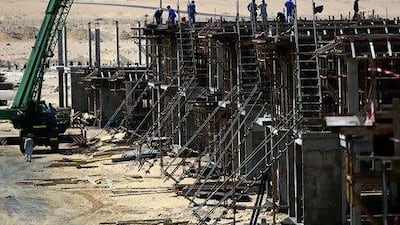Dozens of angry buyers showed up at the Dubailand sales office of the Saudi developer Tanmiyat Properties last week wanting to know why the homes they had bought three years ago were still on the drawing board.
They had bought into the Dh2.7 billion (US$735.1 million) Living Legends project and their properties were supposed to be delivered in 2008. So far only initial preparations are under way at the site.
A new construction company is working on the mostly empty piece of desert in Dubailand, a few kilometres from downtown Dubai, where villas, a golf course and tower blocks are supposed to rise.
More than two years into the property downturn, the dispute is the latest in a series of wrangles across Dubai that are fuelled by a set of complex laws created to regulate the industry.
With prices having dropped by as much as half in some areas and delays of years on construction of buildings, developers and buyers are set to lose fortunes.
At the Tanmiyat meeting, buyers and representatives from the company discussed the project but participants said it felt like neither side was actually speaking to the other.
"We've lost total confidence," says Rob Price, a physical trainer and former British soldier who formed the group that is clashing with Tanmiyat over the project. "They weren't even listening to us. They kept talking about how the project was going ahead."
Tanmiyat, part of a Saudi conglomerate with projects in the UAE and Turkey, argues it is a victim of the financial crisis and is suffering because some investors had reneged on their obligations. It has yet to complete any of its five projects in the UAE.
"We are a good company," says Abdullah al Dehaim, the deputy chief operating officer of Tanmiyat Properties. "We have enough investors to continue the project, inshallah."
Each side has a single weapon in the dispute: buyers can withhold payments and Tanmiyat can push on with construction, forcing investors to commit further funds.
The laws created to regulate property development work on a sliding scale. Buyers must pay additional funds if the project reaches a construction milestone, and if a developer cannot continue it must refund investors.
Sheikh Maktoum Al Maktoum, the chief executive of Al Fajer Properties, has seen these disputes before. Last year, he called the situation between buyers and developers a "zero sum game" because of the law.
"It was a game of chicken between the developer and the investor," Sheikh Maktoum said. "If the developer can't deliver, then the investor gets his money back. If the developer delivers, the investor loses his money [because buyers will receive homes that are worth far less than what they paid]."
The friction between developers and buyers ultimately comes down to who loses and how much.
Mr Price says he invested Dh524,000 in two apartments in Living Legends in 2007. The payment was 30 per cent of the purchase price.
"I spent 24 years in the British army and I put 24 years of my army pension in this project," he says. "I can't afford to lose that."
But he would be willing to lose as much as Dh250,000 as long as he was able to recover the rest of his money.
"We know the financial climate is poor," Mr Price says. "We don't expect all of our investment back, but we'd like a percentage of it back."
A property dispute in Dubai is a tricky dance of tactics, as the dispute between Tanmiyat and the investors group shows.
Rather than ask for the project to be cancelled, Mr Price's group is trying to prove Tanmiyat has broken the contract and should pay back their money.
"Our next step is to go to the authorities," he says. "We're tired of this one-way conversation."
If Tanmiyat can get the project to the point where the Real Estate Regulatory Agency in Dubai says it has completed enough construction for investors to pay the next instalment, it could foreclose on the properties of buyers who are unwilling to pay more money.
Mr al Dehaim says Tanmiyat is prepared to partially fund the project to get things moving again. It recently replaced its construction contractor and has arranged to delay payments to the contractor to ensure adequate funds in the short term.
More than 150 buyers had committed to Tanmiyat to pay more money when the project passed the 25 per cent completion mark, Mr al Dehaim says. The sight of construction workers at the site had "scared" some investors who did not have the funds to pay for their apartments in full.
"If you do not pay, then we will cancel" the contracts and they will lose their money, he adds. "We tried to manage this group in a nice way. They did not all leave happy but we will meet again [this] month."
The new delivery date for the first phase of the project is November next year, according to a plan issued to the regulatory agency that has yet to be approved.
The original plans for 500 villas, 12 residential towers, a golf course, hotel and mall are now being phased in. The overall project could take years to finish.
For now, that means regular meetings between angry investors such as Mr Price and company officials such as Mr al Dehaim, and a drawn-out dispute.
"We are raising the profile now," says Mr Price.
Mr al Dehaim responds: "The dark times are gone. More money is coming back now. We waited for three difficult years."

